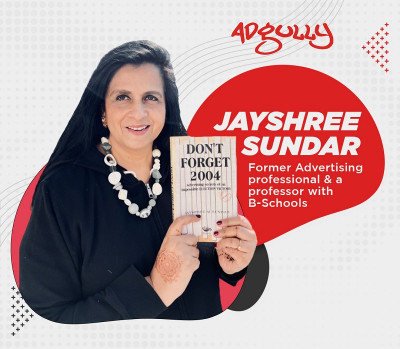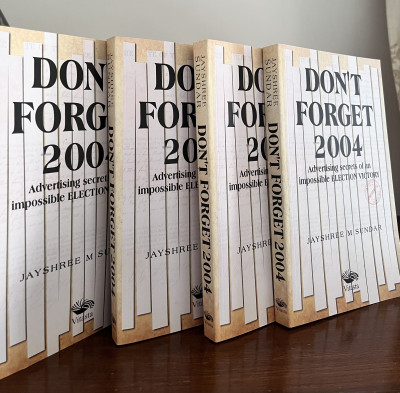“The 2004 elections were the real starting point of Political Branding in Indiaâ€
In December 2003, the Congress party took a huge drubbing in the three state assembly elections. The ‘India Shining’ slogan of the Vajpayee government had taken the country by storm. Elections were called early that year and the defeat was inevitable for the Congress. But it did not happen that way and the Congress was victorious and came back to power.
After 17 years, Jayshree Sundar, who worked with Lintas and then Leo Burnett, was solely instrumental in scripting and leading this campaign victory for the Congress. She unveils the chain of events that took place through her book ‘Don’t Forget 2004’.
Very lucidly written, this book speaks about how Jayshree and her team overcame all the challenges and burnt the midnight oil to create a series of hardworking campaigns for both print and television, which were released across the country. Managing a political campaign is quite tricky and complicated, but Jayshree and her team pulled it off right from pitching for the business to flawlessly executing the campaign and winning the elections for the Congress. This is a true case study of a political campaign and every student should make it a point to read.
In conversation with Adgully, Jayshree Sundar recounts the heady days of creating the winning political campaign for the Congress party and what went on behind the scenes during the entire process.
Writing a book needs a lot of patience and time. What was your objective and what inspired you to write this insightful book ‘Don’t Forget 2004’?
The 2004 elections were the real starting point of Political Branding in India. Where two global agencies were pitted against each other in a “Brand war”. The consumer watched very carefully witnessing a massive upset on the result day withunderdog becoming victorious. There were so many lessons to be learnt from that David Vs Goliath story. This was a story that needed to be told.
And once I started writing it, all it took was two months. It’s a story fresh in my head even today as I teach it like a case study in my MBA classes at least thrice a year. Students sit in rapt attention; I usually get a standing ovation and right up to last year with Covid and Zoom calls, I took these sessions with the same result. It made me think. Why not get this story out to a bigger audience?
I felt I would do a disservice to the world of Advertising if this information remained tacit. After all, it’s one of the biggest advertising related case studies this country has ever seen. Also, a general election comes once in five years. So, there have just been three of them post 2004.
Managing political campaigns is very tricky and complicated. What are some of the challenges you faced as compared to the normal brand campaign you managed in your career?
Yes, there are differences. And similarities. The first thing I told my team is to think of it as a brand. AICC is the company and the Congress party the brand. While strategising, we very much followed the principles of Brand Equity management, wherein we looked at creating salience and relevance – most importantly differentiation and building up to resonance.
The difference is that there is one Buying day – the Voting Day. If the consumer does not go to vote, you lost the “sale”. The other big difference is the size of the target audience. It is potentially every Indian who is 18+ That is a huge number. Carving out who you will call your target consumer is mind boggling as budgets are limited and you can’t talk to everyone.
The issues are very different region wise and state wise. So, in consumer products you need to cover your grey hair to look younger or to have a sharp picture on your Tv or read a discerning business newspaper. And then you can tie consumers nationally with these needs. In Political branding, you will find each state has different issues, so you have to micro manage your advertising and media plan.
What was your experience while engaging with the leaders of the Congress party. Any high points that you could highlight on the entire campaign journey?
Overall, I could figure they had limited experience of dealing with advertising agencies. But they were very quick to learn. And before we met on any key meetings they had talked to people and got themselves familiar with the processes in the industry.
We were actually an extension of their team working in the war room at 99 South Avenue. Our key contacts were Jairam Ramesh, SalmanKhurshid, Motilal Vora, Ahmed Patel and Ambika Soni. Mrs Sonia Gandhi took all the final calls and we met her several times too. So, it was a small team. Meetings were very confidential and there were massive fears of leaks. In the past, elections ads used to leak and rebuttals were out in the same paper on the same day! So, extreme care had to be taken to avoid this.
It was a huge amount of work. The kind of output a telecom brand would do in a year was created and released in 12 languages across media in just 10 weeks. I also found it was a very verbal world. Not written. No time for micro management at the clients end. So, the responsibility was huge at the agency end to ensure deadlines and a mistake free output.It was an exciting work way. Decoy acts and secret rooms unlisted mobile numbers and what not.
When you planned to pen this book, who was the target audience in your mind? Can you explain the kind of thinking and process that went behind in compiling this book and making it relevant and useful?
The target audience was anyone who liked a real life exciting juicystory.
There were many ways I could have approached this. The obvious one being a
typical textbook-like approach, with headlines and sub-headlines and bullet points. Or a management case study like you write for B-Schools. But I thought to myself why not encapsulate the above, but tell it like a story. Like a thriller. And I used the device of my diary and gave a blow-by-blow account of how things unfolded between January and May 2004.
Did you ever dream of managing a political account in your career? What are some of the learnings and knowledge you gained by handling the campaign and managing multiple decision makers?
No, I never dreamt of it. But it did happen winning a fierce eight agency pitch.
The learnings and knowledge were plenty. Managing massive workloads with an almost daily crunch deadline made one very organised. If you read the book, you will see how many crises hit us along the way and how those were dealt with. The power of a young team. And that politicians can be great client collaborators. Multiple levels of people came in and looked at the campaign and gave ideas but whatever was part of the core strategy was never deviated from. One thing for sure it has left me and the entire team of 2004 very invested in politics. So, every experience counts.





Share
Facebook
YouTube
Tweet
Twitter
LinkedIn